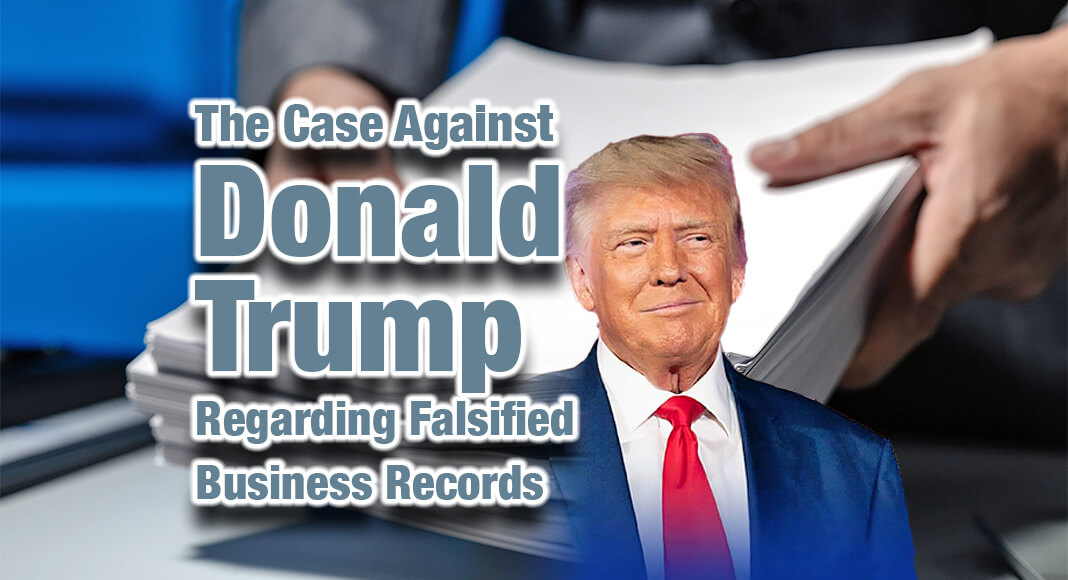
Texas Border Business
Based on the Investigative Bulletin by Judicial Watch
1 – Core Charges and Allegations: The trial involves 34 counts of falsifying business records. These counts are typically treated as misdemeanors. However, Manhattan District Attorney Alvin Bragg is pursuing these charges as felonies. The prosecution claims that these falsified records were part of efforts to hide payments made by the Trump Organization to an adult film star, allegedly to suppress information about an affair before the 2016 presidential election. These payments are suggested to be linked to “election fraud” and a “criminal conspiracy and cover-up.”
2 – Legal Strategy and Challenges: The elevation of misdemeanor charges to felonies hinges on showing that the falsification was part of an intent to commit another crime beyond just the act of falsification itself. New York state law allows for such elevation under Section 175.10 of the penal code if there’s an intent to commit an additional crime, though the specifics of the “other crime” have not been disclosed by the prosecution.
3 Defense Argument: Trump’s defense, represented by attorney Todd Blanche, argues that the 34 counts merely represent routine business activities and that Trump had no direct involvement with the questionable documents or financial transactions. The defense also contests the assertion that the payments were intended to influence the election, framing it as a normal part of democratic processes.
4 Credibility of Key Witness: Michael Cohen, a former executive of the Trump Organization and later a critic of Trump, is a central figure in this case. Cohen’s past, including a criminal record and public disdain for Trump, might undermine his credibility in court. He has been described as unreliable in past testimonies and has a history of seeking publicity, which could influence perceptions of his testimony.
5 Potential Jury Bias: The trial’s location in Manhattan, a region known for its liberal leanings, may also influence how the jury perceives the case. However, jury outcomes can be unpredictable, and inherent biases may impact the decision-making process.
6 Implications and Potential Outcomes: The prosecutors’ strategy of leveraging misdemeanor charges into felonies is a significant legal gamble and could provide solid grounds for appeal by Trump’s legal team if a conviction is achieved. Moreover, the reliance on Cohen as a key witness and the novel legal approach could either backfire or require meticulous substantiation to hold in court.
The unfolding of this trial will depend heavily on the prosecution’s ability to substantiate their claims and navigate the challenges posed by potentially weak witness credibility and complex legal maneuvers. The outcome could have significant repercussions for all involved, including possible appeals and bigger political implications.
Below, read the Investigative Bulletin provided by Judicial Watch.
Trump Trial Prosecutors Face Big Problems
The Donald Trump business records trial opened yesterday in New York City, where prosecutors signaled a wide-ranging case. Documents—business records—related to payments from the Trump Organization to an adult film star showed “election fraud” and a “criminal conspiracy and cover up” designed to prevent information about an alleged affair from emerging before the 2016 presidential election, prosecutor Matthew Colangelo said.
At the heart of the case are thirty-four counts of falsifying business records—generally misdemeanor charges that in this case Manhattan DA Alvin Bragg is attempting to elevate to felonies. Trump defense attorney Todd Blanche told the jury that the thirty-four Bragg charges signified no crimes—that Trump was just doing what a business leader does: sign papers prepared by his office.
“The thirty-four counts are really just thirty-four pieces of paper.” Blanche said. Regarding the paper trail offered up by the prosecution, Blanche said that Trump “had nothing to do with the invoice, with the check being generated or with the entry on the ledger.” Blanche also attacked the prosecution’s contention that the payments were attempts to influence the 2016 election. “I have a spoiler alert,” he said. “There’s nothing wrong with trying to influence an election. It’s called democracy.”
Prosecutors face two big problems with their case: a deeply flawed key witness and a largely untested legal ploy to leverage misdemeanor business-records charges into felony-level convictions.
The case centers around former Trump Organization executive turned Trump nemesis, Michael Cohen. A self-proclaimed former Trump “fixer,” Cohen has a long criminal record and well-known hatred for the forty-fifth president of the United States. In 2016, Cohen expected a position in the Trump Administration, which was not forthcoming. Cohen later became a frequent guest on MSNBC, railing against Trump, and in 2022 he published a three-hundred-page diatribe against Trump, “Revenge.”
In 2018, Cohen pleaded guilty in federal court to tax evasion, campaign finance violations related to the current New York case, and false statements. He was sentenced to a three-year prison term. Later that year, he was back in federal court to plead guilty to lying to Congress.
A month ago, a judge denied Cohen’s request for an early end to his supervised release from jail time, saying Cohen had likely “committed perjury” in past testimony—a finding brushed aside by the judges in Trump’s current civil and criminal cases in New York.
Much of the current case will hinge on Cohen’s credibility on the stand. It’s worth noting that both federal authorities and Bragg’s predecessor as Manhattan DA, Cy Vance, declined to bring the business-records case, uneasy with Cohen and a strategy for getting the misdemeanor charges to felony-level crimes. Mark Pomerantz, a senior Vance prosecutor who resigned after differences with Bragg on Trump prosecutions, noted in his book, “People vs. Donald Trump,” that while Cohen could be charming and credible, he also was “a somewhat feral creature.” Cohen, Pomerantz wrote, has a “penchant for publicity, exaggeration, and grandiose statements” that turn people off.
The second big problem for prosecutors are those thirty-four business records charges usually clocking in as misdemeanors. In opening statements, the prosecution indicated it could prove the charges were felonies by showing they were connected to “election fraud.” But the statute prosecutors rely on has nothing to do with election law. New York state law (Section 175.10 of the penal code) moves falsification of business records from misdemeanor to felony if the defendant’s “intent to defraud includes an intent to commit another crime.”
What precisely is that other crime? At the moment, prosecutors aren’t saying. But eventually they’ll have to come up with something specific.
With a jury drawn from deep blue Manhattan, it may not matter. Jurors may simply dislike Trump so much that they’ll look for any path to conviction. But juries are unpredictable. And the view from here is that Michael Cohen could emerge as a big liability. That sketchy ploy to elevate misdemeanors into felonies also gives the Trump team strong grounds for appeal.
Information source: Judicial Watch
Micah Morrison is chief investigative reporter for Judicial Watch. Tips: mmorrison@judicialwatch.org













